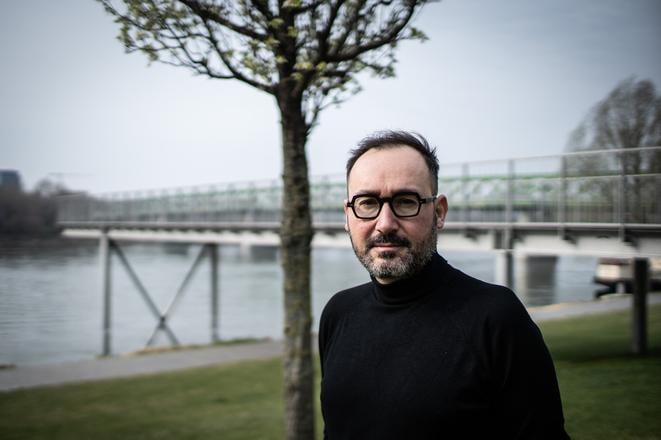Aware that his production conflicts with the recently adopted constitutional amendment, he says he is glad — it clearly demonstrates its absurdity. He brought to the stage a century-old novel by Virginia Woolf, in which the main character wakes up one day as a woman and discovers what it is like to live in two identities.
“It makes me wonder if this production could even be created in Slovakia, and that is why I am very happy that it will be featured at the [Drama Queer] festival. If it causes outrage, I will gladly discuss how we are not showing anything new, but themes and facts that are thousands of years old,” says director Marián Amsler.
In April 2024, PM Robert Fico called artists “mentally homeless.” In response, you wrote on social media that you could no longer live or create in this atmosphere and that you were moving to Prague. Was it difficult to make that decision?
At the time, I was rehearsing Mephisto at the National Theatre in Prague, based on the novel by Klaus Mann, who wrote it in exile in 1936. He described the rise of the NSDAP and, in a visionary way, the course and consequences of the war. The novel takes place in a theatre filled with intellectuals and artists who refused to believe that things could become so bad. That’s when I realised we were reliving it — and that I could no longer stay in Slovakia. The atmosphere was far too close to that before the rise of fascism. I was 45 and had never felt truly free or happy in my own country — a country moving backward instead of forward. I asked myself if it was worth living under constant pressure, labelled a second-class citizen. The answer was no. That’s why I decided to leave.
What happened after you left?
I felt immense relief. I grew up before the [Velvet] Revolution, and as a gay man, I lived for years in fear of being outed. I was attacked by skinheads, had a knife held to my stomach — one of my most traumatic memories. After the last elections, fear and anger began to build up inside me again. Queer people are once again becoming victims of attacks, branded as public enemies. Our lives are in constant danger, and equality remains out of reach. How long can we go on like this?
Can you see events in Slovakia with more distance now?
Since I left, I have realised how much I love Slovakia. But the distance has removed all inner blocks and fears — I can now express myself more openly and intensely, and speak out against things I find wrong, inhuman, or even inhumane. Leaving has completely freed me from self-censorship, which is so easy to fall into in Slovakia. In Czechia, I feel an even greater need to comment on and explain what is happening back home. I’ve given very open interviews. I feel braver now — I no longer care what anyone thinks of me.
What is your view of the cultural and human rights situation in Slovakia?
It’s hard to put it politely. The level of destruction is so great that it’s impossible to stay silent. It’s important to stress that this isn’t about someone losing a project or being without income for a few months. For many, it’s a tangible and deeply depressing reality that they have no future in culture under this government. I’ve felt it both as a person and as an artist. For me, it’s not about money or fame, but about art having a higher meaning — about being beneficial to society. And I am not alone in this. That’s the key difference between us and the dilettantes at the ministry and their followers.
Do people in Czechia understand the situation in Slovakia?
My colleagues in the theatre and at the university do. They perceive it more sensitively than much of society. At the same time, they cannot fully grasp the scale of the destruction or its consequences. They mostly see it as absurd, even comical. But we know there’s nothing funny about it — these are not harmless caricatures without power. The current cultural and political establishment has enormous influence and shows no sign of yielding.
The strike alert didn’t help — nor did protests, petitions, attempts to remove officials, opposition pressure, complaints, or committee summons. People in Czechia can’t understand how it’s possible that no one bears responsibility and that all democratic mechanisms are failing. How can this be happening in a democratic country?
This interview takes place in the wake of the Czech parliamentary elections, in which Andrej Babiš won and far-right parties performed well too. Does that change things?
The mood is not very optimistic, especially given the success of the Motoristé party, which is inherently misogynistic, xenophobic, and rooted in fascist ideas. Before the elections, many people from the cultural sphere refused to believe they could do so well — so the result came as a bitter disappointment.



